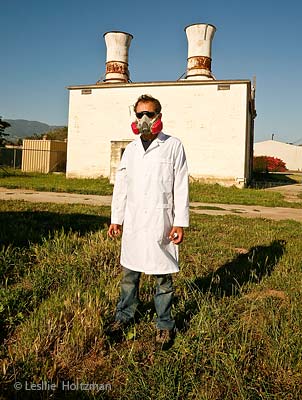Rocking Toward the End of the World
Doom Corporation Mixes One Part Punk, One Part Metal, One Part News, and One Part Jokes
In the first half of his September 17 show, The Chemist spends an hour talking in serious depth with 9/11 conspiracy theorist Tod Fletcher. This is the second week of the “Conspiranoia Spectacular,” an annual tradition on Doom Corporation meant to provide an “opportunity to examine creepy facts and reach uncomfortable conclusions.”
Toward the end of the show, The Chemist plays a South Park clip which hilariously satirizes the tenuousness of many 9/11 conspiracy theorists’ claims. Call this mix of content what you will; at least it’s a distinctive interpretation of being “fair and balanced.”

The interview no doubt got casual listeners closer than they’ve ever been to the out-of-the-way world of 9/11 conspiracy theorists. Beginning as a broad discussion of the issues on the movement’s mind, it eventually became a blitz of questions and comments about information, misinformation, and disinformation regarding FAA tapes, stand-down orders, nanothermite, “floor pancaking,” Mohammed Atta, iron oxide, iron sulfide, “Operation Gladio,” and even the very laws of physics. But eventually, The Chemist could no longer ignore his show’s other mandate: “I hope your tinfoil hats didn’t fall on the ground,” he told his audience after concluding the conversation. “Now let’s play some rock and roll.”
Thus began Doom Corporation’s musical half, a potent blend of classic punk rock, crust, doom metal, and 90s speed metal, or, as The Chemist put it, “protest rock for when some guy singing and strumming doesn’t cut it.”
It’s a sound seemingly available nowhere else on the dial, and that’s why he spins it. “I listen to a bunch of types of music,” he explained, “but I play only this type, because it’s underrepresented on the radio. I got into punk rock because of the lyrics, the energy. I saw my first punk band in ‘81, and I still groove on and play a lot of the old songs. These bands were exploding in the 80s—the music then wasn’t only what people think it was. Kids listening to fake-ass punk rock today have no idea where it came from!”
Songs from these genres have generally turned up the intensity dial way too far for the uninitiated listener to understand their lyrics. Yet anyone playing them on the air still runs into, as The Chemist calls it, “the f-word problem.” Different KCSBers handle this different ways. Some do their DJ duties exclusively between the legally mandated “safe harbor” hours of 10 p.m. and 6 a.m., when the FCC is more or less okay with musical swearing. Some track down versions of songs that have been edited for radio, or they make them themselves. Lacking the time for those options, The Chemist instead cuts out the FCC-prohibited words in real time, swiftly punching the mute button whenever an “f-word” approaches. He’s been getting better and better at this with practice. As he put it, “I asymptotically approach zero indecency.”
Throughout the show, the studio phone kept ringing and ringing. “KCSB complaint hotline,” The Chemist would answer, but every caller seemed to be a satisfied customer. Perhaps this combination of niche music and niche issues is statistically unlikely to attract such a response, but these listeners were engaged. “I started noticing that the people calling were in their 50s and 60s, and I couldn’t figure it out,” The Chemist said. “Then they told me that they tune in for the news, and turn the radio down when I play music. Of course, some people turn the music up and the news down.”
It’s reasonably safe to say that this combination is available nowhere but on KCSB, and the station’s freeform programming philosophy fits perfectly with The Chemist’s own. “I believe college radio has a responsibility to fill a niche,” he said. “You need to do what KCRW doesn’t do, or if you do do it, you need to do it better than KCRW does. All musical genres have certain albums which nail it on every song, so you can make a good show out of any of them. Except R&B slow jams.”
The Chemist, who merits his nom de guerre by actually holding a PhD in the subject, prefers to cover scientific and technological stories in his program’s news analysis segments. Within that, he’s particularly interested in those to do with what he calls “the human-instigated collapse of civilization.” While there’s definitely an apocalyptic tone to the current events he covers—and given the presence of the word “doom” right there in the name, you can’t say he didn’t warn you—it’s not all about the breakdown of society and the end of the world. “I also try to do good news,” he noted. “Alternative energy and other things that improve the world. But I also cover science and technology that’s going to kill people based on their stupidity. Pandora’s Box stuff. I do both ends of the spectrum.”
Despite the often dark nature of both the news and the music, The Chemist approaches everything with a bulletproof sense of humor. Why does he laugh? “Because you have to,” he said. “If you get too serious about it, you get depressed, especially if you have all these facts right in front of you and nobody cares. I try to keep hope alive. You know these criminals are never going to be punished, so I say, let’s just make them look like fools. I’m not a humanitarian, but I believe in justice.”
4•1•1
Doom Corporation airs Fridays from 11:30 a.m. to 2 p.m. on KCSB, 91.9 FM.



